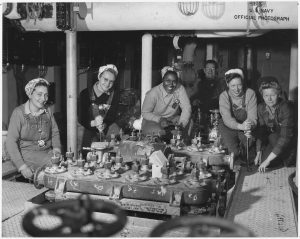With Judy Issokson
‘X’ Marks the Spot 
We work in places that can be marked on a map with an ‘X’. Those places are occupied by people who come from many other places, with multiple perceptions, and experiences. The walls of our workplaces look and feel solid, but they are porous. Personal experiences and responses to all that occurs in our respective worlds seep into the workplace and impact the relationships that used to be separated (or so we thought) by political, religious and class differences. Regardless of where we are on the political or religious spectrum, regardless of our race, gender, or national origin, we all have thoughts and feelings about what is happening in our world and the impact of those events on our lives.
The workplace is not a microcosm of our world, nor is it a metaphor of our world, it is our world. Just as our home, our community, our city or town, our state, our nation, is our world. So, when we are thinking about what we just read on Twitter or saw on the evening news, those thoughts come with us into the workplace and impact our relationships in that part of our world.
As one of our first steps to aligning communication, let’s make sure that we are using the same vocabulary.
Relationships: the way in which people, groups, countries, etc., talk to, behave toward, and deal with each other.
Social Justice: a fair and just relationship between an individual and society.
The Work 
Creating inclusion out of our diversity, helping people to relate more indivisibly, teaching leaders to lead more effectively and communicators to communicate more successfully, is a type of activism. We work to raise people’s awareness that their relationships matter, that empathy matters, that inclusion matters. Our work is a form of social justice as we strive to help people treat each other fairly and justly.
Social Justice is exhausting. It’s big. It’s important. We may think it’s a mandate, and it is for some, but not for all. (ironic?) We may think it’s a right— and it is until it isn’t—or it was until it wasn’t. We may hear it’s a privilege- and it isn’t. It’s evidence that we have come a long way and that we have many more miles to go.
On the good days, there’s the organizing, meeting, defending, advocating, listening, collaborating, reading, scanning, posting, talking, campaigning, calling, aligning with others, learning and a sense of making progress.
On the not-so-good days, there’s the organizing, meeting, defending, advocating, listening, collaborating, reading, scanning, posting, talking, campaigning, calling, aligning with others, learning and a sense of defeat.
And as long as we maintain that Social Justice is big and conceptual, we lose. Sometime, somewhere, each of us has likely said or thought “how can my thoughts/actions possibly make a difference with ‘X’?” And then one day, we maintain that Social Justice is not big and conceptual. It is personal. Our thoughts and actions are engaged and activated. We are touched personally and emotionally. Sometime, somewhere, each of us has likely said or thought: ‘The status quo of ‘X’ is unacceptable. This is my fight and my right. I can help make a difference with ‘X’.” We engage and connect, and we fight for justice— a place where winning means our actions may have impacted others; a place where the hearts and minds of others have shifted to see, accept, adapt, embrace, perceive and live differently.
A Call to Action
In the workplace, the focus of diversity and inclusion, as well as leadership development, is frequently on sharing the ‘big ideas’ and explaining the ‘right thing’ (as mandated or spelled out in the law.) We comply with the bare minimum by signing up for classes in person or on-line. We complete the seat-time and check the box. The minimum standard is met. We have participated in the big and the conceptual.
And then one day at work we have an experience that triggers something personal. Whether it happens directly or indirectly, we feel the need to speak up, take action, and hold someone accountable for better behavior in “X”. We are on the path for taking action for the social justice in our immediate community— at work, at home, in our teams, or when we look in the mirror.
Just as an “X” marks the spot on a treasure map, so does it mark a spot for discovering the issues or insights that incite you to action; and if you are incited to action, you are likely to be intrinsically motivated to do the ‘exhausting’ work and be energized by it.
The first step in doing the real work of diversity and inclusion, as well as leadership development is to articulate your “X”. Next, the work becomes designing the journey to get there in the most meaningful way possible— “X”-ercising your right to make a positive difference— for yourself and others.
The Big Picture 
When we work with clients to facilitate a more inclusive socially just workplace, we are the guides: a person’s path to empathy or an organization’s inclusiveness can only be accomplished and maintained by its citizens – those in relationship with others – for whom there is a great deal at stake. We do our best to never mistake the map for the territory.
In the next installments of ‘X’ Marks the Spot, we will share some of our most successful strategies and techniques. We will discuss how, for us, this work is personal and local and global and matters.
Onward!
Judy Issokson & Wendy Amengual Wark
March 6, 2017
~~~~~~~~~~~~~~~~~~~~~~~~~~~~~~~~~~~~~~~~~~~~
Judy Issokson, EDD, PCC
Owner, Issokson & Associates
Over the past twenty-five years, Judy has worked in multiple industries in both private and public sectors with internal and external clients eager to align organizational structure to emerging business needs, improve global implementations, define improved strategies for effective transitions, and fine tune organizational integration processes.
Judy holds a Doctorate in Educational Leadership and Masters in Education from Northeastern University and a BS in English Education from Boston University. Her professional certifications include International Coaching Federation Professional Coaching Certification, Myer-Briggs Type Inventory, Facet5, Trust Works, Emotional Competency Inventories, Authentic Leadership, and various 360 assessments.
https://www.linkedin.com/in/issoksonandassociates/
Wendy Amengual Wark
Founder, Inclusion Strategy Solutions LLC
Wendy Amengual Wark, the Founder of Inclusion Strategy Solutions LLC has worked in the field of diversity and inclusion since 1988. Wendy helps employers to develop and implement practical and sustainable inclusion processes such as cultural assessments, strategic diversity planning, inclusive communications, customized training, mentoring programs, and employee resource groups. Wendy is in demand as a speaker and presenter at conferences and writes a blog on all things inclusion. She is writing the upcoming book, Let’s Not Be Polite: Overcoming Barriers to Inclusion.
Wendy has studied at Columbia University, Graduate School of Arts and Sciences; the City College of New York, City University of New York; and the University of Cambridge, Cambridge, England and achieved several high academic honors, including Phi Beta Kappa and a Ford Foundation Fellowship.
https://www.linkedin.com/in/wendyamengualwark/
